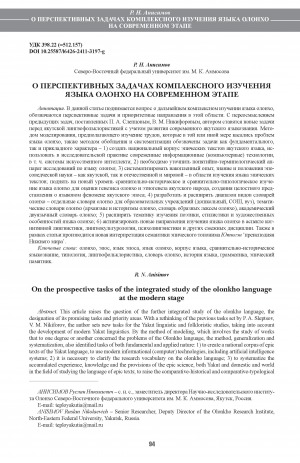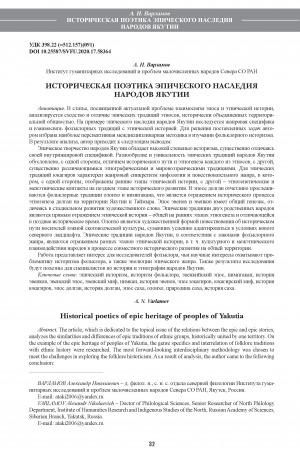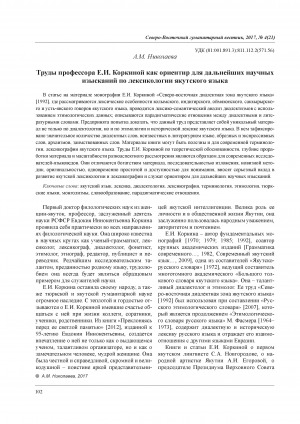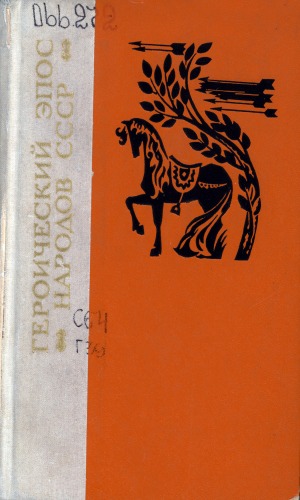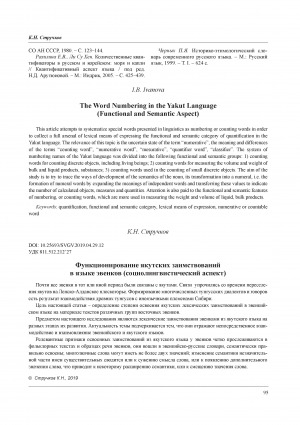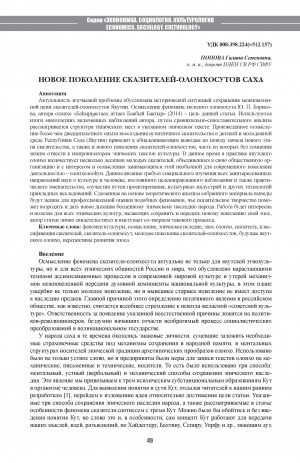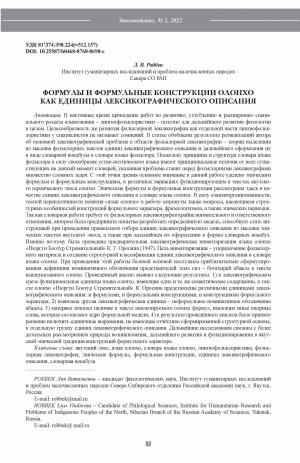
О некоторых монголизмах в диалектной лексике якутского языка (на материале языка олонхо) = On certain Mongolic loanword in the dialectal lexicon of the Yakut language (based on the language of olonkho)
Статья в журнале
Русский
811.512.3ʼ28:398.224(=512.157)
10.25587/2782-4861-2025-2-117-136
монголизмы; якутский язык; олонхо; языковые контакты; ландшафтная терминология; историческая лингвистика; этимология; эпос; этногенез; фольклористика; Mongolic loanwords; Sakha language; olonkho; language contact; landscape terminology; historical linguistics; etymology; epic; ethnogenesis; folkloristics
Вестник Северо-Восточного федерального университета им. М. К. Аммосова. Серия "Эпосоведение". - 2025. - N 2 (38)
The present article is devoted to the study of Mongolic borrowings in the language of the Yakut heroic epic olonkho, with a particular focus on lexicon related to inanimate nature (15 items): names of landscape features (8) and atmospheric and natural phenomena (7). As a central element of the Yakut oral tradition, olonkho serves not only as a major source of folklore but also as valuable evidence of linguistic and cultural contact that took place over the centuries. The material for the study consists of olonkho texts recorded by authors from various dialectal regions, which allows for an assessment of the geographic distribution of Mongolic borrowings across the territory of Yakutia. The methodological foundation of the study is based on an ethnolinguistic approach, according to which the vocabulary of olonkho is viewed as a reflection of the traditional cultural and mythopoetic worldview of the Sakha people. In the empirical part of the research, methods of comparative-historical, etymological, and contextual analysis are applied, along with elements of cognitive linguistics that facilitate the reconstruction of conceptual models underlying the functioning of Mongolic loanwords in the epic text. Special attention is given to folkloric-semantic analysis, aimed at identifying culturally conditioned meanings of lexical items and their role in structuring the epic worldview of olonkho. The results of the study indicate an even distribution of Mongolic elements across all dialect zones, confirming long-standing and intensive contact between the ancestors of the Sakha and Mongolic-speaking peoples. Furthermore, many of the examined borrowings demonstrate a high degree of integration into the Yakut language and are scarcely perceived by native speakers as foreign elements. This points to the deep adaptation of Mongolic lexicon and its organic incorporation into the Yakut linguistic system. The findings contribute to a deeper understanding of linguistic interaction and the ethnogenetic processes of the Sakha people, while also offering new prospects for further research in the fields of historical linguistics and folklore studies. The article may be of interest to folklorists, epic scholars, linguists, students of the humanities, and all those interested in the structure and semantics of the olonkho language as a reflection of the cultural memory of the Sakha people.
Турантаева, Н. В. О некоторых монголизмах в диалектной лексике якутского языка (на материале языка олонхо) / Н. В. Турантаева, Н. В. Малышева ; Северо-Восточный федеральный университет им. М. К. Аммосова // Вестник Северо-Восточного федерального университета им. М. К. Аммосова. Серия "Эпосоведение". - 2025. - N 2 (38). - С. 117-136. - DOI: 10.25587/2782-4861-2025-2-117-136
DOI: 10.25587/2782-4861-2025-2-117-136
Войдите в систему, чтобы открыть документ

